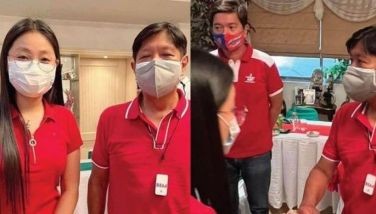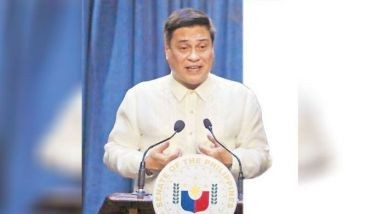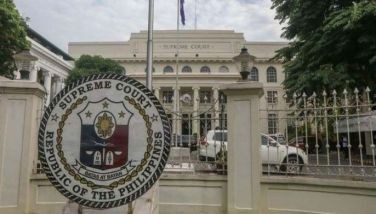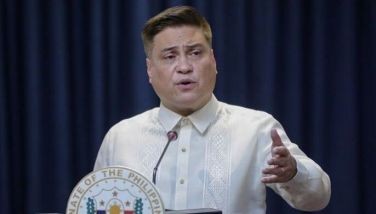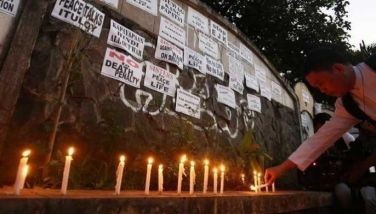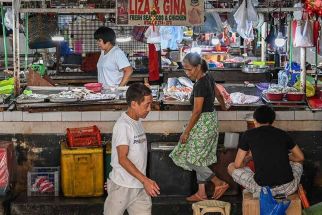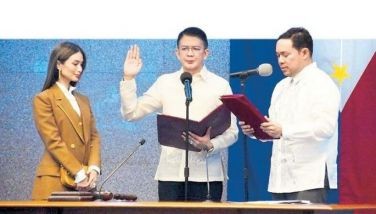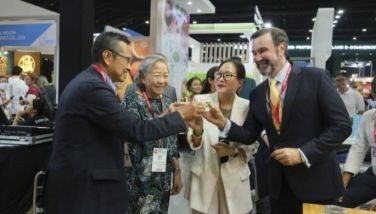Angara: Archaic government setup hindering RP development
June 12, 2006 | 12:00am
Sen. Edgardo Angara said yesterday the country’s "archaic governmental setup" has hindered development and had kept the nation from reaping the benefits of genuine independence.
Speaking yesterday on the eve of Philippine Independence Day, Angara reiterated the need for the country to shift from the presidential to a parliamentary form of government.
"Our government structure is a remnant of our colonial past," he said.
"Seventy-one years after we first adopted the Philippine Constitution, we still have the same administrative setup, the same kind of almost feudalistic system," he said.
Angara is pushing for the devolution and decentralization of powers from the central government to the provinces.
"In essence, we are living in a time warp," he said. "We are governed by a political and administrative arrangement that hampers our growth and pulls us down."
Angara said the people should not only give more power to the provinces and municipalities but also pour in more resources to local governments.
"Indeed power will be useless without corresponding resources," he said.
Angara said many dynamic and forward-thinking mayors, lawmakers and governors cannot initiate anything without the say-so of Malacañang.
"There is no better time for us to abandon this time warp and join
the modern world in economic and social progress," he said. "We must enable our people to use their creativity, talent and imagination," he said.
Many good projects in the provinces cannot be implemented because the resources are all centralized in Manila, he added.
Angara said the present form of a highly centralized, highly bureaucratic government hampers development.
Its structure was introduced by the Philippine Bill of 1902 to replace a military administration, and was an attempt to install a civilian government, one that was especially designed to control an archipelago, he added.
Angara said the continued campaign for immediate independence during the American period gave birth to the Philippine Independence Bill or the Jones Law of 1916, the country’s organic law or constitution from 1916 to 1935.
"Our government was made specifically and deliberately centralized and bureaucratic, so that no one, in a country of many islands, can move without the knowledge and direct approval of the governor-general," he said.
"Now, more than seven decades after, that same structure remains. Some say our president is the most powerful ever, even more than the US president, because he continues to hold the powers of a governor general."
Again, the same form of government was carried forward after the adoption of the 1935 constitution, and the same government structure remained intact, he added.
Earlier, Malacañang said parliamentary elections, along with scheduled local polls, could be held next year if the campaign to amend the Constitution succeeds.
Press Secretary Ignacio Bunye Jr. gave assurances that the May 2007 elections will push through as scheduled.
He maintained there was no conflict between the ongoing campaign to amend the Constitution and the holding of the mid-term elections next year.
"There will be elections definitely in 2007, these preparations can go alongside the Charter change preparations. I don’t think these developments are inconsistent," Bunye said.
"As far as we know there will be elections. As to the extent, that depends on what will happen between now and 2007," he said.
The Arroyo administration is pressing for a shift to a unicameral parliamentary system of government this year through Charter change, after which an interim parliament headed by a prime minister would be set up composed of sitting members of Congress until elections for members of parliament could be held.
To achieve its objective, the administration is simultaneously supporting efforts in the House of Representatives to convene both chambers of Congress into a constituent assembly, and the ongoing people’s initiative supported by local governments and private groups.
Apart from changing the current form of government, constitutional amendment proponents want to lift limits on foreign participation in the local economy.
Arroyo allies in the House have repeatedly predicted that an interim parliament could be formed this year.
A federal system has also gained favor among provincial governments, which have long been dissatisfied over the dominance of "Imperial Manila."
The Constitution, provides three methods for making amendments: through a constituent assembly, a constitutional convention or a people’s initiative.
In a constituent assembly, the legislature would propose amendments.
In a constitutional convention, delegates elected by the people would make the amendments. In a people’s initiative, at least 12 percent of the electorate may propose changes through a petition.
All amendments must be ratified by the people in a plebiscite.
Speaking yesterday on the eve of Philippine Independence Day, Angara reiterated the need for the country to shift from the presidential to a parliamentary form of government.
"Our government structure is a remnant of our colonial past," he said.
"Seventy-one years after we first adopted the Philippine Constitution, we still have the same administrative setup, the same kind of almost feudalistic system," he said.
Angara is pushing for the devolution and decentralization of powers from the central government to the provinces.
"In essence, we are living in a time warp," he said. "We are governed by a political and administrative arrangement that hampers our growth and pulls us down."
Angara said the people should not only give more power to the provinces and municipalities but also pour in more resources to local governments.
"Indeed power will be useless without corresponding resources," he said.
Angara said many dynamic and forward-thinking mayors, lawmakers and governors cannot initiate anything without the say-so of Malacañang.
"There is no better time for us to abandon this time warp and join
the modern world in economic and social progress," he said. "We must enable our people to use their creativity, talent and imagination," he said.
Many good projects in the provinces cannot be implemented because the resources are all centralized in Manila, he added.
Angara said the present form of a highly centralized, highly bureaucratic government hampers development.
Its structure was introduced by the Philippine Bill of 1902 to replace a military administration, and was an attempt to install a civilian government, one that was especially designed to control an archipelago, he added.
Angara said the continued campaign for immediate independence during the American period gave birth to the Philippine Independence Bill or the Jones Law of 1916, the country’s organic law or constitution from 1916 to 1935.
"Our government was made specifically and deliberately centralized and bureaucratic, so that no one, in a country of many islands, can move without the knowledge and direct approval of the governor-general," he said.
"Now, more than seven decades after, that same structure remains. Some say our president is the most powerful ever, even more than the US president, because he continues to hold the powers of a governor general."
Again, the same form of government was carried forward after the adoption of the 1935 constitution, and the same government structure remained intact, he added.
Earlier, Malacañang said parliamentary elections, along with scheduled local polls, could be held next year if the campaign to amend the Constitution succeeds.
Press Secretary Ignacio Bunye Jr. gave assurances that the May 2007 elections will push through as scheduled.
He maintained there was no conflict between the ongoing campaign to amend the Constitution and the holding of the mid-term elections next year.
"There will be elections definitely in 2007, these preparations can go alongside the Charter change preparations. I don’t think these developments are inconsistent," Bunye said.
"As far as we know there will be elections. As to the extent, that depends on what will happen between now and 2007," he said.
The Arroyo administration is pressing for a shift to a unicameral parliamentary system of government this year through Charter change, after which an interim parliament headed by a prime minister would be set up composed of sitting members of Congress until elections for members of parliament could be held.
To achieve its objective, the administration is simultaneously supporting efforts in the House of Representatives to convene both chambers of Congress into a constituent assembly, and the ongoing people’s initiative supported by local governments and private groups.
Apart from changing the current form of government, constitutional amendment proponents want to lift limits on foreign participation in the local economy.
Arroyo allies in the House have repeatedly predicted that an interim parliament could be formed this year.
A federal system has also gained favor among provincial governments, which have long been dissatisfied over the dominance of "Imperial Manila."
The Constitution, provides three methods for making amendments: through a constituent assembly, a constitutional convention or a people’s initiative.
In a constituent assembly, the legislature would propose amendments.
In a constitutional convention, delegates elected by the people would make the amendments. In a people’s initiative, at least 12 percent of the electorate may propose changes through a petition.
All amendments must be ratified by the people in a plebiscite.
BrandSpace Articles
<
>
- Latest
- Trending
Trending
Latest
Trending
Latest
Recommended














